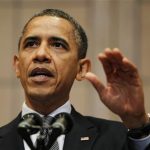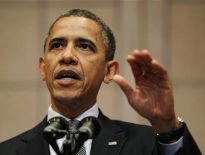(Reuters) – Mitt Romney’s expected wins in five states that hold primary votes on Tuesday
will earn him scores of delegates on his way to becoming the Republican presidential nominee and allow him to concentrate on
a general election campaign against President Barack Obama.
The two sides have already engaged in heavy combat and that will only
increase in the six months of campaigning that are to follow until Americans vote on November 6 to decide whether to give the
incumbent another four years or install a new leader.
Victories anticipated in Connecticut, Delaware, New York,
Pennsylvania and Rhode Island will be big boost to Romney’s lead in the race for 1,144 delegates to officially become the
Republican nominee, a designation that is still weeks away.
Romney could reach upwards of 800 delegates with the 200
or so at stake on Tuesday. His only remaining rivals in the Republican race are Newt Gingrich and Ron Paul, both of whom are
very far behind in both polls and the delegate count.
Romney, a moderate former governor of Massachusetts, enters the
general election campaign bruised from a bitter primary battle with a series of conservative challengers who questioned the
sincerity of his conservative beliefs.
“I need your help on November 6,” he told supporters in South Park Township
outside Pittsburgh on Monday. “Come join us in this effort.”
His immediate tasks are many. He must consolidate
conservatives behind him and begin taking steps to attract independent voters, who are likely to decide the election. He
needs to bolster lagging support among women voters, Hispanics and young people.
He is also building a much larger
staff geared toward the general election after relying on a close coterie of loyal insiders for months.
And he is
searching for a vice presidential running mate from among several contenders such as Florida Senator Marco Rubio, who
campaigned with him in Pennsylvania on Monday.
In spite of his challenges, Romney begins the campaign in a strong
position. National opinion polls show a tight race developing between him and Obama.
Obama, with all the advantages of
the incumbency, is well-liked by Americans but there are deep doubts about his handling of the U.S. economy and anger over
high gasoline prices which may, however, be trending downward.
He must convince Americans that his prescriptions for
the sluggish economy will lead not just to a stock market gains, but to real job growth among the dispirited middle
class.
Given the stakes, the campaign will likely be overwhelmingly negative as the two sides battle through TV and
radio ads. Both candidates and outside groups that support them are building campaign war chests likely to reach into the
hundreds of millions of dollars.
Their goal is to portray the other side as being out of touch with the concerns of
ordinary Americans and unable to solve intractable problems from debt to deficits to caring for an aging
population.
Tuesday could be the end of the line for former House of Representatives Speaker Gingrich, whose campaign
is out of steam and deep in debt. He has been hanging on to keep pressing Romney on conservative issues.
(Editing by
Wilson)





